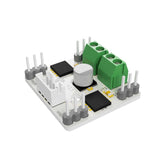Once upon a time in the vast and evolving landscape of technology, two terms emerged, often used interchangeably yet distinct in their essence: coding and programming. This tale unfolds within the binary realms, where the quest for understanding becomes as critical as the innovations these practices birth. Join us as we embark on a detailed journey, elucidating the differences between coding and programming, supported by the latest statistics and data.
Understanding the Basics
Coding
Coding is the process of translating human intentions into a language that a computer can understand. It involves writing lines of code in various programming languages such as Python, Java, or C++. Coders, akin to artisans, craft the building blocks of software, focusing on the precise execution of small, specific tasks.
Programming
Programming, on the other hand, encompasses not only writing code but also the planning, designing, testing, and maintenance of software applications. Programmers, therefore, are like architects and builders, ensuring that the edifice of software is not only functional but also stable and sustainable over time.
Statistics and Data: The Scale of Difference
Delving into the numbers reveals the practical distinctions and overlaps between coding and programming in the tech ecosystem:
| Aspect | Coding | Programming |
|---|---|---|
| Focus Area | Writing code for individual tasks or features | Entire software development lifecycle |
| Required Skill Level | Beginner to intermediate | Intermediate to advanced |
| Tools Used | Text editors, compilers | Integrated Development Environments (IDEs), debuggers, version control |
| Outcome | Executable code snippets | Complete software applications |
According to the Bureau of Labor Statistics, employment in software development roles is projected to grow 22% from 2020 to 2030, much faster than the average for all occupations. This growth underscores the increasing demand for both coding and programming skills in the digital age.
The Interplay Between Coding and Programming
While coding and programming serve different purposes, they are intrinsically linked. Coding is a subset of programming, serving as the foundation upon which the broader architecture of programming is built. Understanding this relationship is crucial for aspiring developers, as mastery in coding can pave the way to more comprehensive programming roles.
- Scope: Coding focuses on writing code, while programming involves the full software development lifecycle.
- Skills: Coding requires understanding of programming languages, whereas programming demands a broader skill set, including problem-solving, software testing, and system design.
- Tools: Coders primarily use text editors and compilers, while programmers utilize a wider array of tools, including IDEs and version control systems.
The journey from coding to programming is marked by an expansion of scope, skills, and tools. As we continue to navigate the digital epoch, the distinction between coding and programming becomes not just a matter of semantics, but a reflection of the depth and breadth of engagement with the technology that shapes our world. Whether you're a novice coder or an experienced programmer, the adventure through the realms of software development is both challenging and rewarding.
As we demystify the differences between coding and programming, we encourage learners and professionals alike to embrace both the detail-oriented craft of coding and the comprehensive vision of programming. In doing so, we not only contribute to the technological tapestry but also ensure a versatile and robust foundation for the innovations of tomorrow.
FAQ
What is the main difference between coding and programming?
Answer: The main difference lies in their scope and objectives. Coding is the process of translating requirements into a computer language, focusing on writing code for specific tasks. Programming encompasses the entire software development lifecycle, including planning, designing, coding, testing, and maintenance of software applications.
Do I need to learn coding before programming?
Answer: Yes, learning to code is typically the first step into the world of programming. Coding teaches you the basics of computer languages, which is essential for tackling the more complex tasks involved in programming.
Which programming languages should I start with?
Answer: Beginners often start with Python due to its simplicity and readability. Other popular languages for beginners include Java, C++, and JavaScript, depending on the area of interest (e.g., web development, software engineering, data science).
Can I be a programmer without being good at math?
Answer: Yes, you can become a programmer without being an expert in math. While certain areas of programming (like algorithms, machine learning, and game development) may require strong mathematical skills, many programming tasks focus more on logic, problem-solving, and understanding user needs.
How long does it take to learn coding?
Answer: The time it takes to learn coding can vary widely depending on your learning pace, the programming language, and how much time you dedicate to practice. Many people can learn the basics of a programming language in a few months with consistent study and practice.
Is coding still in demand?
Answer: Absolutely. The demand for coding skills continues to grow across various industries. The Bureau of Labor Statistics projects a 22% growth in software development jobs from 2020 to 2030, significantly faster than the average for all occupations.
What tools do I need to start coding?
Answer: To start coding, you need a computer, a text editor (like Notepad++, Sublime Text, or Visual Studio Code), and access to compilers or interpreters for the language you choose to learn. Many resources and tutorials are available online for free.
Can coding be self-taught?
Answer: Yes, many resources are available for those who wish to teach themselves coding, including online courses, tutorials, forums, and coding challenges. Self-teaching requires discipline, motivation, and persistence but is entirely feasible.
How can I transition from coding to programming?
Answer: Transitioning from coding to programming involves expanding your skill set to include understanding software development methodologies, learning about software design patterns, mastering debugging and testing techniques, and gaining experience in project management. Engaging in larger projects, contributing to open-source software, or pursuing further education in software engineering can facilitate this transition.
">




